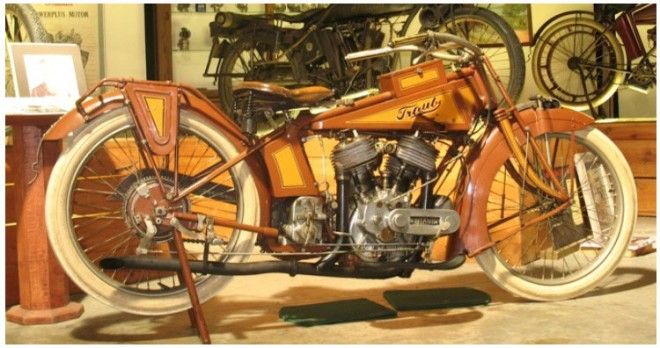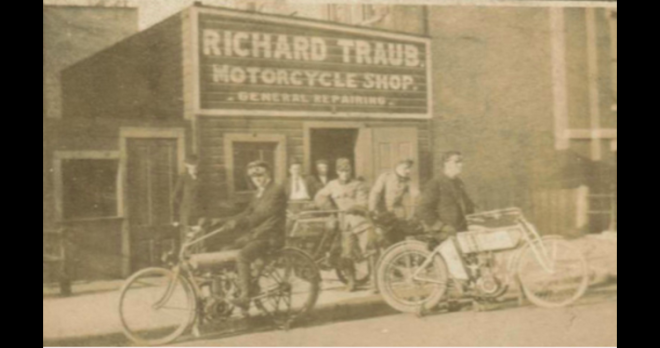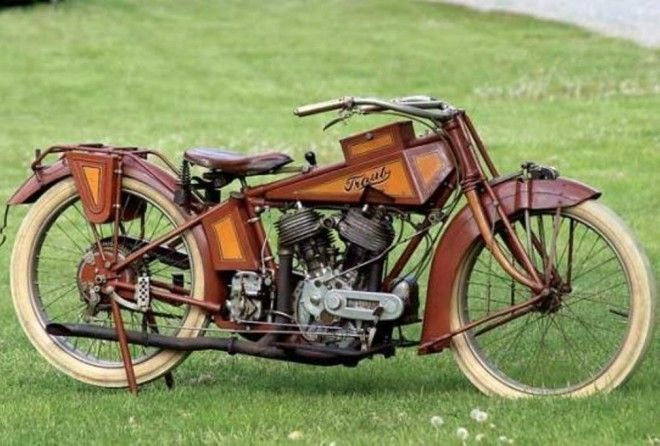This is exactly what happened with the rarest of all motorcycles – the Traub motorcycle. Not a known name in the world of motorcycle manufacturing, the Traub was discovered in 1968. Even though major parts of the motorcycle were hand-built, some of the off-the-shelf parts used have helped to determine the time of the creation of the motorcycle to be around 1916.
The 1916 Traub motorcycle was discovered hidden within the walls of a Chicago apartment in 1968. Only one such motorcycle exists in the world. Even though it remained hidden for more than 50 years, surprisingly, it was still in running condition.

In 1968, a plumber was carrying out renovation of an old apartment building in Chicago. He tore down a brick wall and was surprised to discover an old motorcycle hidden behind it. The motorcycle had the name “Traub” written on its tank.
As soon as the discovery was made, the original owners of the building were tracked down. They revealed that years ago, their son had stolen this motorcycle, most probably from the original owner, before going away to fight in the World War I. Perhaps the son hid the motorcycle in the wall to safeguard it until he returned from the war. But, unfortunately, he was killed in action and never returned leaving the motorcycle hidden away from the world for over 50 years.
Soon after its discovery, the motorcycle went through the hands of a number of owners, finally landing with Dale Walksler, the founder of Wheels Through Time Museum.

When the Traub motorcycle was first discovered in 1968, it was acquired by a Chicago motorcycle dealer by the name of Torello Tacchi. He traded a $700 Suzuki in exchange for the motorcycle and worked on it to bring it to perfect working condition. The motorcycle remained in his possession for about 10 years and was later purchased by Bud Ekins, the stuntman for the famous star Steve McQueen. Ekins again sold it to Richard Morris, a bike collector from California.
Finally, the Traub made its way to Dale Walksler who is the founder of the famous Wheels Through Time Museum. The museum has continued to be the home for the rare bike since its purchase by Walksler in 1990. Amazingly, the 101-year-old Traub still runs perfectly, and Walksler even up to today enjoys an occasional ride.
The motorcycle is well-known not only because it’s the only one of its kind but because of its high-quality craftsmanship. Experts have called it one of the most advanced machines of the early 20th century.
The 1916 Traub is the only one of its kind. Sure there have been numerous classical bikes throughout history, but none can surpass the complex engineering of the Traub. The machinery and the technique used to build the motorcycle was well ahead of its time. Most of the parts were hand-made with gapless cast iron rings. Also, the parts that were found on the motorcycle were never seen on any other bikes throughout history. It is as if the parts were specifically made for this machine only.
The 80cc, V-twin engine of the Tarub is hand built, sand cast, and is one of its kind. The Traub was equipped with a three-speed transmission which experts believe to be one of the first of its kind. The dual-acting brake system is also unique and never seen on any bikes of that era.
Historians and experts have been speculating for a long time on who the creator of the Traub might have been. The most promising candidate has been Gottlieb Richard Traub.

Historians have been frustrated for years over the identity of the Traub’s creator. Even though many have narrowed down the creator to a man named Gottlieb Richard Traub, there is no definitive proof. Gottlieb Richard Traub was a German born in America. In July 1907, Richard Traub wrote a letter to the editor of the Motorcycle Illustrated. In the letter, he mentioned in detail about a four-horsepower motorcycle that he built at home. The specifications of the motorcycle that he built were similar to that of the 1916 Traub. Moreover, he also owned a shop known as “Richard Traub Motorcycle Shop.” Above, you can see an image of the shop. In the image, the motorcycle to the right bears a strong resemblance to the 1916 Traub.
It is not clear when or where this photo was taken. But reports suggest that Richard Traub used to work out of a garage attached to his home. From the letter that Richard Traub sent to Motorcycle Illustrated, it was discovered that his home was located at Paulina Street, Chicago. Moreover, the apartment from which the motorcycle was retrieved in 1968 is located close to this particular street. This strongly suggests that there is a high possibility that Gottlieb Richard Traub might actually have been the creator of this rare and amazing motorcycle, even though there is no solid proof.

